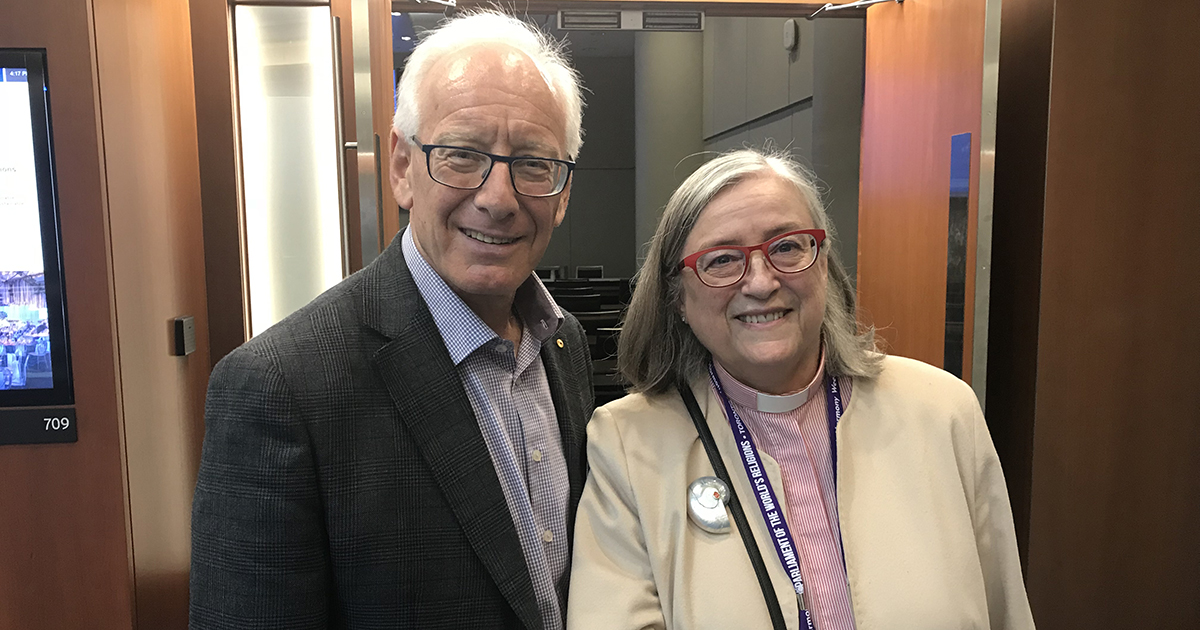The following is the final instalment of a four-part series on the Anglican presence at the 2018 Parliament of the World’s Religions. Read part one, part two, and part three.
Collaboration, peaceful coexistence, and pursuing the well-being of communities together were common themes at the 2018 Parliament of the World’s Religions. Anglicans present at the multi-faith gathering showcased their efforts towards these goals by facilitating workshops that were spread out over the course of the seven-day conference.
Among them was the Rev. Laurette Glasgow, special advisor for government relations for the Anglican Church of Canada and the Diocese of Ottawa. Glasgow’s presentation was titled Project Rozana: Building Better Understanding Between Israelis and Palestinians Through Health.
Project Rozana is an international initiative that seeks to build relationships between Israelis and Palestinians, by funding projects that facilitate the provision of health services. Specifically, it raises money for the training of Palestinian health professionals in Israeli hospitals, who can then return to fill health care gaps in their own communities. The project also provides funding for the transportation of Palestinian patients from Gaza and the West Bank to Israeli hospitals, and for the treatment of Palestinian children.
Currently serving as a board member of Project Rozana Canada, Glasgow spoke on the theological foundations of the project. She noted that all three Abrahamic faith traditions—Judaism, Christianity, and Islam—recognize the integral role of healing in living out their respective faiths through sacred texts, traditions, and actions.
During two tours to the Holy Land, Glasgow visited Israeli hospitals and treatment centres, which she saw had greater capacity to provide treatment than Palestinian facilities.
“In the health sector … political differences are set aside,” Glasgow said. “It’s a very complex scenario, but [in] the hospitals that we visited in the last tour … you see Israelis, you see Arab Israelis, Jewish Israelis, Palestinians, working side by side.”
Ron Finkel, president of Hadassah Australia and founder of Project Rozana, highlighted the role of Anglicans in providing health care in the region—particularly through the Episcopal Diocese of Jerusalem and its stewardship of the Al Ahli Arab Hospital in Gaza, which provides health services to people of all faiths.
In recent years, Finkel has sought to deepen ties with the Anglican Church of Canada. He has met with Archbishop and Primate Fred Hiltz, Archbishop Colin Johnson – Bishop of Toronto, and other Canadian Anglican leaders.
“The Anglican Church has a well-respected, longstanding footprint in the Middle East,” Finkel said. “The diocese is a key player, and one of its arms of influence in impact is through health. The number of clinics and medical and health institutions that the diocese of Jerusalem is responsible for is significant, and not least because they have a major hospital in Gaza.”
“All the hospital health infrastructure in Jerusalem, a city of faith and hope, [is] delivered by faith-based institutions,” he added. “That says something of their commitment to healing, and it reflects itself in the attitude of the Anglican Communion here in Canada. And for that I’m very grateful and I’m very excited, because I think we’ve got a great future together.”
Interested in keeping up-to-date on news, opinion, events and resources from the Anglican Church of Canada? Sign up for our email alerts .

